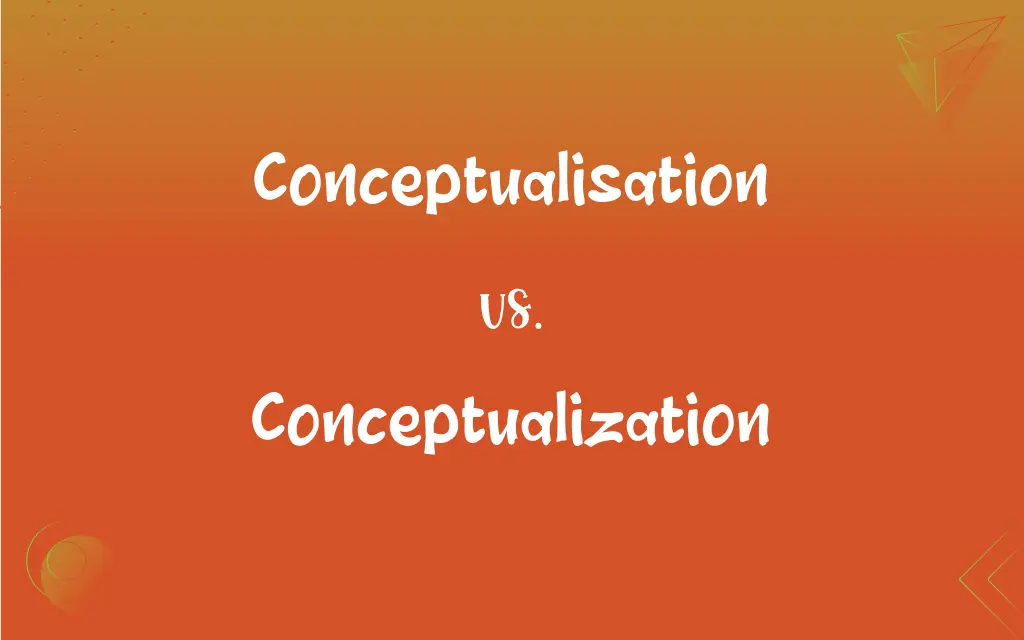Conceptualisation vs. Conceptualization: What's the Difference?
Edited by Aimie Carlson || By Janet White || Updated on November 10, 2023
"Conceptualisation" and "conceptualization" are the same word, with "conceptualisation" being the British spelling and "conceptualization" the American. Both refer to the process of forming a concept or idea.

Key Differences
Conceptualisation is the British English spelling of the term, which refers to the process of forming a concept or idea. Conceptualization, spelled with a 'z', is the American English variant of the same word, carrying the same meaning.
In the context of academia or professional writing, conceptualisation is often used in publications or documents following British English conventions. Conceptualization, on the other hand, is used in texts adhering to American English standards.
The meaning and usage of conceptualisation and conceptualization are identical, both referring to the act of developing a concept or theory in the mind. The choice between the two spellings depends solely on the linguistic style being followed.
When engaging in conceptualisation, one might be involved in creating a theoretical framework for a study or project. Similarly, conceptualization involves the same process of theory or concept development, irrespective of the spelling difference.
In international settings or collaborative works, the preference between conceptualisation and conceptualization may vary based on the agreed-upon language style, British or American English, but the fundamental process described by both terms remains the same.
ADVERTISEMENT
Comparison Chart
Spelling
Conceptualisation
Conceptualization
Usage
In British English contexts
In American English contexts
Meaning
Forming a concept or idea
Forming a concept or idea
Academic Use
Preferred in British academic writing
Preferred in American academic writing
Linguistic Style
Part of British English conventions
Part of American English conventions
ADVERTISEMENT
Conceptualisation and Conceptualization Definitions
Conceptualisation
Theory Formation.
The conceptualisation of her theory took months.
Conceptualization
Mental Process.
Conceptualization requires creativity and logic.
Conceptualisation
Idea Development.
Conceptualisation is key in design thinking.
Conceptualization
Concept Development.
Innovative conceptualization drives technological advancements.
Conceptualisation
Mental Process.
Conceptualisation involves deep mental engagement.
Conceptualization
Framework Creation.
Her conceptualization of the model was groundbreaking.
Conceptualisation
Framework Creation.
His conceptualisation of the project was innovative.
Conceptualization
Theory Formation.
The conceptualization of his theory changed the field.
Conceptualisation
Concept Development.
She excelled in the conceptualisation of complex ideas.
Conceptualization
To form a concept or concepts of, and especially to interpret in a conceptual way
This cabaret performance was conceptualized as a homage to vaudeville.
Conceptualisation
The act of conceptualising, or something conceptualised.
Conceptualization
To form concepts.
Conceptualisation
The act of formulating or making a concept of something.
Conceptualization
The process of forming a conceptual form of a phenomenon; the act of conceptualizing
Conceptualisation
An elaborated concept
Conceptualization
The concept so formed; something conceptualized
Conceptualisation
Inventing or contriving an idea or explanation and formulating it mentally
Conceptualization
The act of formulating or making a concept of something.
Conceptualization
An elaborated concept.
Conceptualization
Inventing or contriving an idea or explanation and formulating it mentally
Conceptualization
An elaborated concept
Conceptualization
Idea Development.
Effective conceptualization is crucial in problem-solving.
FAQs
Is the process described by both terms the same?
Yes, both refer to developing theories or concepts.
Are conceptualisation and conceptualization interchangeable?
Yes, in meaning, but the choice depends on the language style.
Can I use conceptualisation in American English?
Typically, 'conceptualization' is preferred in American English.
What is conceptualisation?
The British English spelling for forming concepts or ideas.
How is conceptualization used in a sentence?
"The conceptualization of the project took several brainstorming sessions."
What’s an example of conceptualisation in use?
"Her research involved the conceptualisation of new marketing strategies."
What is conceptualization?
The American English variant of the term for forming concepts.
Is one spelling more correct than the other?
No, it depends on the linguistic context (British or American English).
Do these terms appear in everyday language?
They are more common in professional or academic contexts.
Is conceptualization accepted in British academic writing?
British English generally uses 'conceptualisation'.
Are there differences in pronunciation?
No, both are pronounced the same.
Does conceptualization play a role in innovation?
Absolutely, it’s key in developing new ideas and solutions.
Does the meaning change with different spellings?
No, the meaning remains the same.
Which industries use these terms?
Academia, research, design, and business often use these terms.
Should I use conceptualisation in international publications?
It depends on the publication's language guidelines.
Can the terms be used interchangeably in a global company?
Yes, but it’s important to maintain consistency in company documents.
How important is conceptualisation in research?
It’s crucial for theory development and understanding phenomena.
Can these terms apply to any field of study?
Yes, they are broadly applicable across various disciplines.
Can non-native speakers use both forms?
Yes, but consistency with one form of English is advisable.
Is conceptualization a complex process?
It can be, as it involves developing detailed and abstract ideas.
About Author
Written by
Janet WhiteJanet White has been an esteemed writer and blogger for Difference Wiki. Holding a Master's degree in Science and Medical Journalism from the prestigious Boston University, she has consistently demonstrated her expertise and passion for her field. When she's not immersed in her work, Janet relishes her time exercising, delving into a good book, and cherishing moments with friends and family.
Edited by
Aimie CarlsonAimie Carlson, holding a master's degree in English literature, is a fervent English language enthusiast. She lends her writing talents to Difference Wiki, a prominent website that specializes in comparisons, offering readers insightful analyses that both captivate and inform.































































